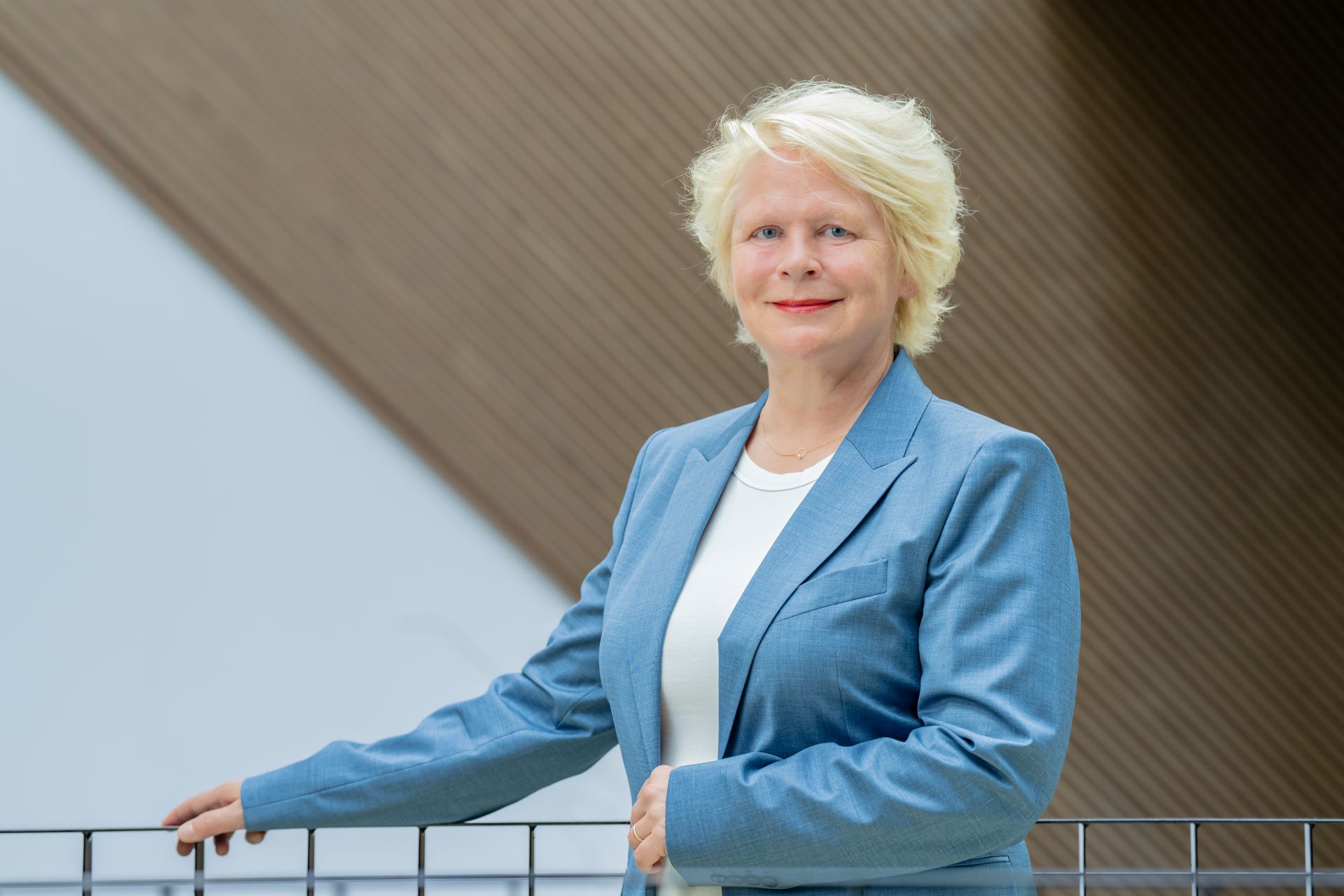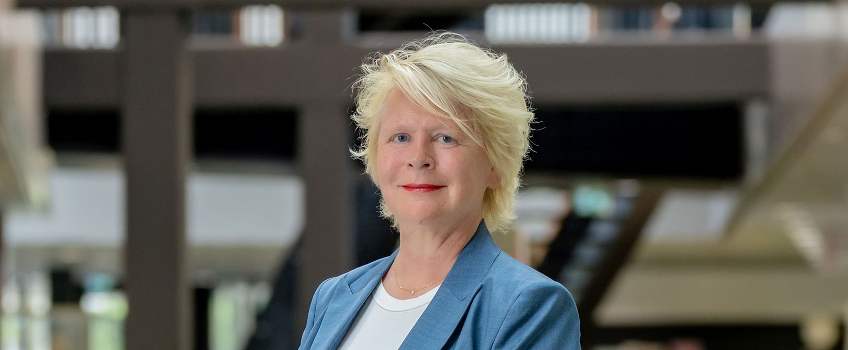Marjan Hammersma began chairing the Board of Governors of Avans University of Applied Sciences on 1 September. Since then she has been hard at work familiarising herself with every aspect of the organisation. How did she like her first month? And how does she view the challenges currently facing Avans?
What is your first impression of Avans?
“It’s vibrant,” she declares. “You notice that even when walking here from the station.” Today Marjan is visiting the Avans building on Bossche Onderwijsboulevard for the first time. “All around you students are laughing, chatting. Talking about revising for an exam. Saying that they don’t know which room they should be in. Whatever it is, I like conviviality. I like being among people. The hustle and bustle of this kind of college site, that’s a big plus of my new job.”
You have been working at Avans for a month now. Before that you took more than six months off on a sabbatical. What is it like to be back at work?
“Fantastic! I’m completely rested and refreshed, and am really looking forward to it. I’ve been travelling for the past few months, and above all walking a lot. I’ve had a clearout, went bird watching and took a course. And at the same time pondered my future. My contract with my old employer, the Ministry of Education, Culture and Science [OCW] had expired, and I wanted to move in a different direction.”
You worked at OCW for the best part of 20 years, the last seven of them as secretary-general – the “big boss”. Why were you so keen to move into education?
“My original background is in culture and media; that’s how I ended up at the ministry. But once there I came more and more into contact with education policy, especially as secretary-general. Over the years I‘ve I become convinced of the importance of good education to offer young people opportunities. It’s the foundation of our society.
“I used to call OCW ‘the ministry of hope and the future’. Optimism, young people with talents and ideals, with their whole future ahead of them – being able to contribute to that through education has been a huge motivating force for me in recent years. What it’s like to be really close to that hope and that future, that was something I wanted to experience for myself.”
And why did you choose a university of applied sciences?
“In my previous job, I worked well with people from the universities of applied sciences. When drawing up a human capital or knowledge agenda, for example. They’re a bit more pragmatic and can be really enthusiastic about new developments. It’s easier to reach solid agreements with them. That mentality also suits me as a person: I think it’s important to be able to collaborate effectively and to achieve a goal together.”
Continued below

“Also, in my view professional higher education is indispensable for the future of our nation. Just look at the demographics: we are getting older and older. Society is ageing. We need to think hard about how the Netherlands can continue to function properly. Universities of applied sciences have a major role to play in this; we’re in a unique position because we’re able to make education and research practically applicable in a world that’s presenting us with increasingly complex issues. We should be prouder about saying that out loud.”
Your job interview was not the first time you been at Avans.
“As secretary-general, about five years ago I paid a working visit to Avans in Breda. I spent a whole day with then chair of the Executive Board, Paul Rüpp. I already knew him well, as we regularly encountered one another in our work.”
Did you think to yourself back then, “One day I’m going to work here”?
“I was enthused by Paul’s story. He talked about how professional higher education was stepping out of the shadow of vocational training on the one hand and academic HE on the other. Linking research and teaching, developing modular education, giving students the right skills and attitude, his pedagogical ideals for the future of Avans: it all came up.”
And that enthusiasm nestled in your mind...
“I visited several universities of applied sciences, but Avans did stick in my mind. Because the human dimension is central here, the space to develop yourself whether you are a student or a member of staff.”
How does that suit you as an administrator and manager?
“I’m an approachable person. I greatly enjoy working with other people to get things done. I try to provide guidance, whilst at the same time trusting people and giving them a lot of space. Even the space to head the wrong direction once in a while. In my previous jobs it was often said that I was ‘friendly and clear’. In my view, that sums it up nicely.”
You find it important that people feel seen and heard.
“Definitely. That’s an important value for me in my work. I like to be in close and direct contact with the people here at Avans, including the students. If only because I want to know what the consequences of any decision are: how does it affect the people who actually have to deal with it in their work? And is it workable in practice? I always want to keep up a dialogue about that.”
What are your ambitions in the long term?
“I have two main goals at the moment. One is to make sure that Avans, building on the strong foundations that have already been laid, remains relevant as a knowledge-based institution. For students and for society. My second goal is to ensure that, as an employee of Avans, you can be yourself and develop your potential.”
It is quite likely that the Executive Board will have to make some tough decisions pretty soon. Avans is facing plenty of challenges: the decline in student numbers, a major round of funding cuts in higher education, less financial support from the National Education Programme (NPO). What will all that mean for the organisation?
“I can’t sugar-coat it: Avans’ budget is going to shrink. Because of that, we’re going to have to be inventive. In fact, I can already see that happening in places. The end of NPO funding is annoying, but not a surprise. As an organisation, we’ve been anticipating it. I also see that colleagues are used to looking carefully at the budget, and in the past year have already been taking action where they can.
“We do now see more challenges coming our way, which means that we’ll have to do even more. Within the organisation, we need to collaborate more – and more inteliigently. And we need to continue seeking out new external partnerships. We have to work together to tackle this shrinkage. All based on input from our tutors, researchers and other staff, who know best what is needed to guarantee the quality of our education and research.”
Is it not difficult to have started this job in such turbulent times?
“No, I don’t think so. If we do this together, we will succeed. I’ve only been here a month, but I’m already impressed by the commitment shown by everyone at Avans. I’m an optimistic person: it won’t always be easy, but I’m confident that we can pull through this together.”
One final question: after your first month chairing the Executive Board, what would you still like to say to everyone at Avans?
“Whether you have an interesting project or idea or you’re organising a fun event: invite me! I was recently at the INTRO Festival in Breda and I enjoyed it immensely. I could see our students having a good time, and I was able to meet and chat with colleagues. Even after such a short time here, at that moment I felt part of the Avans community. That’s why I really value invitations like that. So keep them coming!”
